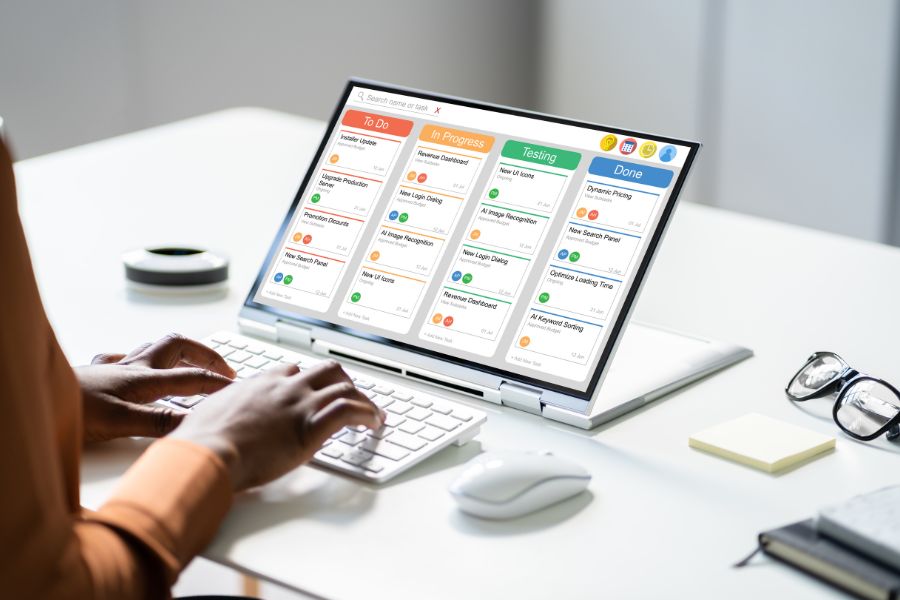Acquiring new customers can be up to five times more expensive than retaining existing ones. The sole figure proves why building lasting relationships is key to sustainable growth. One of the most effective ways to retain customers and keep them coming back is by offering a strategic loyalty program. Today’s consumers are more likely to stick with brands that recognize their loyalty and provide meaningful rewards in return. That’s where top-tier customer loyalty software steps in. Regardless you’re running a small business or managing a large enterprise, a suitable loyalty solution can turn occasional shoppers into lifelong brand advocates.
In this post, we’ll explore the 5 best customer loyalty software in the US that are not only transforming customer engagement but are also helping businesses drive repeat sales and build lasting relationships.
Highlights:
- Loyal customers spend more, spread the word, and stick around—making them the lifeblood of any thriving brand.
- Look for loyalty software that not only syncs effortlessly across your sales channels but also gives you the tools to craft personalized, irresistible rewards.
What is Customer Loyalty Software?
Customer loyalty software refers to a digital tool or platform that helps businesses manage and enhance their customer loyalty programs. These programs aim to reward customers for their repeated engagement or purchases, thereby encouraging long-term relationships and brand loyalty.
Customer loyalty software can significantly improve a business’s performance by fostering deeper connections with their customers, and supporting sustainable growth.
Below are the key benefits:
- Improved Customer Engagement: Loyalty software empowers businesses to create personalized and engaging rewards programs. Features like point systems, VIP tiers, and referral incentives motivate customers to interact more often, driving stronger connections with the brand and enhancing overall loyalty.
- Data-Driven Insights for Smarter Decisions: Loyalty software provides valuable data on customer behavior, preferences, and purchasing patterns. Businesses can analyze this data to segment their audience, tailor marketing campaigns, and optimize loyalty rewards based on real-time customer activity. As a result, businesses can make more informed decisions that boost customer satisfaction and engagement.
- Revenue Growth Through Retention: Loyal customers tend to spend more and return often, directly boosting sales. By offering rewards and incentives through loyalty software, businesses can encourage repeat purchases and cross-sell additional products, ultimately increasing revenue over time. The software also helps reduce customer acquisition costs by focusing on retaining existing customers.
- Streamlined Management with Automation: Loyalty software automates key retention processes, making it easier for businesses to track points, send out offers, and manage customer rewards at scale. This automation saves time and maintains consistency in delivering personalized experiences to customers.
- Tailored Customer Experiences: With loyalty software, businesses can identify key customer segments and create reward structures that fit specific criteria. For example, customers who meet certain spending thresholds can receive exclusive discounts or free shipping. This level of personalization enhances the overall customer experience while encouraging continued brand loyalty.
Criteria for Choosing Customer Loyalty Software
Selecting the right customer loyalty software involves considering key factors that align with your business goals and enhance customer engagement. Below are important criteria to guide your decision:
Main Features
- Personalization Capabilities
Personalization is a cornerstone of effective loyalty programs. The software should be able to create rewards and offers that reflect individual customer preferences and behaviors. For example, a coffee shop might send a free beverage offer to a customer who frequently orders the same drink.
Research shows that 53% of businesses with loyalty programs plan to introduce personalized rewards within the next three years to increase customer lifetime value. This reflects a growing trend in the industry, as personalization is seen as a driving force for deeper customer relationships.
- Multi-Channel Integration
A modern loyalty program must connect across all customer touchpoints, including in-store, online, and mobile. The goal is to guarantee that customers can earn and redeem rewards no matter where they engage with your brand.
Take Sephora, for example. Their customers easily earn and redeem points regardless of where they decide to shop – in-store, online, or through the app. The convenience of point redemption is the main reason why shoppers prefer to stay with the cosmetic retailer.
- Ease of Use and Scalability
The platform should be user-friendly for both customers and employees. Moreover, it should be flexible enough to grow alongside your business.
For instance, a small boutique with limited orders should be able to easily manage its loyalty program, while a larger retail chain needs more advanced capabilities to handle increased customer volume and rewards.
A scalable solution like ConnectPOS, with an integrated loyalty feature, would be a strong option for businesses of all sizes, from small shops to large enterprises.
- Data Security and Privacy
Protecting customer data is paramount, especially with increasingly strict data protection laws like GDPR and CCPA. Your loyalty software should include strong security measures, such as encryption and secure data storage, to safeguard sensitive customer data. In addition, it should offer clear opt-in options to comply with privacy laws.
Starbucks’ loyalty program, for example, encrypts their customer data and secure storage, meeting both legal requirements and customer expectations for privacy.
Customer Support and Usability
A strong customer support system can make all the difference when running a loyalty program. The software should offer easy onboarding, provide detailed documentation, and be accessible through multiple support channels like email, chat, and phone.
Shopify’s loyalty software offers 24/7 customer support with a dedicated help center, making it easier for businesses to implement and manage their loyalty program.
Pricing and Flexibility
The pricing of loyalty software should align with your budget and offer flexible plans. Look for solutions that offer tiered pricing based on features or user numbers, allowing you to pay for what you need without overspending. For example, Yotpo presents a free version for smaller businesses alongside more advanced paid options for larger enterprises.
In addition to pricing, the software should allow businesses to customize their reward systems effectively.
In 2022, businesses using tiered loyalty systems saw a 15% rise in customer retention, demonstrating the importance of adaptable rewards.
Top 5 Customer Loyalty Software: US Edition
Customer loyalty programs have become essential for businesses aiming to retain customers and boost long-term growth. Choosing the right software to manage these programs is crucial. Here are the top five customer loyalty software solutions in the US:
Yotpo
Yotpo is a leading e-commerce marketing platform that integrates customer loyalty programs with user-generated content such as reviews, referrals, and social media. With a strong focus on customer engagement, Yotpo helps businesses build stronger relationships through personalized experiences.
Key Features
- Points-based rewards, referrals, and VIP tiers
- Easy integration with major e-commerce platforms like Shopify, Magento, and BigCommerce
- Seamless connection with email and SMS marketing
- In-depth analytics and campaign performance tracking
Best Use Case
Yotpo is best suited for e-commerce brands looking to combine their loyalty programs with powerful customer review and referral systems to enhance social proof and engagement.
Pros & Cons
Pros:
- Comprehensive loyalty program features
- Strong focus on customer reviews and referrals
- Integration with email and SMS marketing for personalized campaigns
Cons:
- Pricing can be steep for larger businesses
- May require more advanced setup for full functionality
Smile.io
Smile.io provides an easy-to-use loyalty program platform tailored for small to medium-sized businesses. Known for its simplicity and scalability, Smile.io enables brands to create point-based rewards programs, referral campaigns, and VIP tiers that are customizable to each business’s branding and goals.
Key Features
- Simple points, referral, and VIP program setup
- User-friendly dashboard with real-time insights
- Integrates with Shopify, BigCommerce, and WooCommerce
- Customizable rewards system with flexible options
Best Use Case
Smile.io is ideal for small to medium-sized businesses that want an easy, affordable loyalty solution with the ability to scale as their customer base grows.
Pros & Cons
Pros:
- Affordable and easy to set up
- Great for small to medium businesses
- Wide range of integrations with popular platforms
Cons:
- Limited advanced analytics
- Customization options may feel basic for larger businesses
LoyaltyLion
LoyaltyLion is a highly customizable loyalty platform designed to cater to both e-commerce and brick-and-mortar businesses. It offers a range of rewards and engagement features while also providing deep insights into customer behavior, allowing businesses to make data-driven decisions about their loyalty programs.
Key Features
- Advanced reward structures and customizable loyalty rules
- Omnichannel capabilities for both in-store and online programs
- Customer segmentation for personalized experiences
- Detailed analytics and insights into customer behaviors
Best Use Case
LoyaltyLion is ideal for fast-growing e-commerce stores that require deep customization and insights into their loyalty program while also offering the ability to scale as their customer base expands.
Pros & Cons
Pros:
- Highly customizable for advanced loyalty campaigns
- In-depth insights and analytics
- Supports both in-store and online loyalty programs
Cons:
- Higher cost for premium features
- Learning curve for implementing more complex customizations
Zoho CRM Plus
Zoho CRM Plus is a comprehensive customer relationship management platform that integrates loyalty program capabilities with marketing, sales, and support tools. Known for its automation and AI-powered insights, Zoho CRM Plus is perfect for businesses seeking a unified solution for customer relationship and loyalty management.
Key Features
- AI-powered customer insights and segmentation
- Workflow automation for loyalty campaigns
- Comprehensive suite for CRM, marketing, and support tools
- Omnichannel engagement across email, social media, and messaging apps
Best Use Case
Zoho CRM Plus is perfect for mid to large-sized businesses looking for an all-in-one platform that integrates loyalty programs with CRM and marketing tools to deliver seamless customer experiences.
Pros & Cons
Pros:
- All-in-one CRM with loyalty management
- AI-driven insights for personalized experiences
- Workflow automation for marketing and loyalty campaigns
Cons:
- May be overwhelming for small businesses
- Requires time to learn and configure advanced features
ConnectPOS
ConnectPOS provides a comprehensive suite of tools specifically designed for retailers, with a standout loyalty program that integrates seamlessly into its system.
Built for omnichannel businesses, the platform allows retailers to manage loyalty programs across physical and online stores, giving them a complete view of customer engagement through real-time data analytics. ConnectPOS is not just a POS system but a powerful tool that blends in-store and e-commerce loyalty strategies, ensuring a unified customer experience at every touchpoint.
Key Features
- Integrated loyalty program with customizable rewards, points, and exclusive promotions
- Real-time analytics and reporting across multiple stores and sales channels
- Omnichannel loyalty management for both in-store and online customers
- Easy integration with popular e-commerce platforms like Shopify, Magento, WooCommerce
- Tiered loyalty and VIP programs to reward your best customers with exclusive perks
- Instant reward redemption, allowing customers to use points in real-time, both online and offline
Best Use Case
ConnectPOS is ideal for mid to large retailers in industries such as apparel, home décor, electronics, vape/CBD, and firearms, offering a seamless loyalty experience across all customer touchpoints. Its real-time data and omnichannel capabilities make it a top choice for businesses in these sectors seeking a unified solution to manage loyalty across multiple stores, platforms, and sales channels.
Pros & Cons
Pros:
- Fully integrated loyalty program embedded directly into the POS system
- Real-time insights into customer behavior and loyalty performance
- Seamless omnichannel loyalty management, supporting both in-store and online purchases
- Supports advanced loyalty features like tiered rewards and VIP programs for top customers
- Scalable solution suitable for businesses of all sizes, from small boutiques to large retail chains
Cons:
- Some advanced features may require a more technical setup
- No hardware provided
FAQs: Customer Loyalty Software
- Can loyalty software integrate with my existing POS system?
Yes, many customer loyalty software solutions are designed to integrate seamlessly with existing POS systems. This integration allows businesses to manage loyalty programs directly through their POS, enabling real-time updates on customer transactions, points accumulation, and rewards redemption. Before selecting a loyalty software provider, it’s essential to verify compatibility with your current POS system to ensure a smooth implementation.
- How much should I expect to pay for loyalty software?
The cost of customer loyalty software can vary widely depending on the provider, features, and the size of your business. On average, businesses can expect to pay anywhere from $50 to several hundred dollars per month. Some providers may also charge transaction fees or offer tiered pricing based on the number of users or transactions. It’s crucial to assess your specific needs and budget before making a decision and to consider any additional costs for integrations or customizations.
- What is the difference between CRM and customer loyalty?
CRM POS (Customer Relationship Management) refers to the technology used to manage interactions between a company and its current and potential customers. It collects and organizes customer data, helping to assess and influence customer behavior while enhancing their overall experience. In contrast, customer loyalty specifically focuses on retaining existing customers and nurturing their ongoing relationship with the brand.
Conclusion
It’s well known that returning customers spend more than new ones, making a strong case for investing in customer loyalty software. Prioritizing retention through effective loyalty programs can significantly boost your business’s bottom line. The solutions we’ve covered offer a range of features tailored to meet diverse business goals. By focusing on rewarding your existing customer base, you can drive repeat sales, increase engagement, and turn loyal customers into long-term brand advocates.
For a powerful, omnichannel loyalty program, reach out to ConnectPOS and discover how they can elevate your customer retention strategy.
ConnectPOS is a all-in-one point of sale solution tailored to meet your eCommerce POS needs, streamline business operations, boost sales, and enhance customer experience in diverse industries. We offer custom POS with features, pricing, and plans to suit your unique business requirements.




